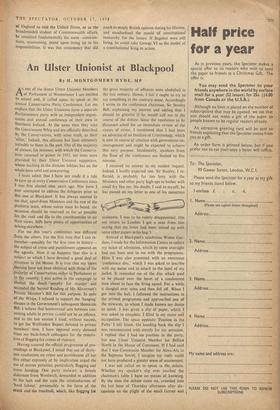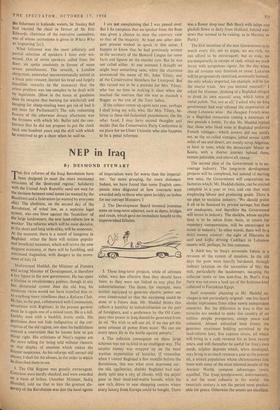An Ulster Unionist at Blackpool
By H. MONTGOMERY HYDE, MP As one of the dozen Ulster Unionist Members of Parliament at Westminster I am entitled to attend and, if called upon, to speak at the annual Conservative Party Conference. Let me explain that the Ulster Unionists form a separate Parliamentary party with an independent organi- sation and annual conference of their own in Northern Ireland. At the same time they take the Government Whip and are officially described by the Conservatives, with some truth, as their `allies.' Indeed, this alliance has been extremely valuable to them in the past. Out of the majority of sixteen, for instance, with which the Conserva- tives returned to power in 1951, ten seats' were provided by their Ulster Unionist supporters, whose backing in the division lobbies has on the whole been solid and unwavering.
I must adrhit that I have not made it a rule to turn up at every Conservative Conference since I. was first elected nine years ago. Nor have I ever attempted to address the delegates prior to this one at Blackpool. It has always seemed to me that, apart 'from Ministers and the rest of the platform team, whose voices must be heard, the occasion should be reserved as far as possible for the rank and file in the constituencies to air their views. MPs have plenty of opportunities of talking elsewhere. • For me this year's conference was different from the others. For the first time that I can re- member---possibly for the first time in history— the subject of crime and punishment appeared on the agenda. Now it so happens that this is a subject to which I have devoted a good deal of ,attention in the. Mouse. It- is true that my views ,thereon have not been identical with those of the majority of Conservatives either in Parliament or in the country. I was active in the campaign to abolish the death penalty for murder and seconded the Second-Reading of Mr. Silverman's Private Member's Bill for this puipose. In spite of the Whips, I refused to support the `hanging' clauses in the Government's subsequent Homicide Bill. I believe that homosexual acts between con- senting adults in private should not be an offence, and in the last session I tried, without success, to get the Wolfenden Report debated in private members' time. I have opposed every demand from my back-bench colleagues for the restora- tion of flogging for crimes of violence.
Having scanned the official programme of pro- ceedings at Blackpool, I noted that out of thirty- one resolutions on crime and .punishment all but five either expressly or by implication urged the use of sterner penalties, particularly flogging and more hanging. One party stalwart, a female alderman from Woolwich, demanded in addition to the lash and the rope the reintroduction of `hard labour,' presumably, in the form of the crank and the treadmill, which, like flogging for the great majority of offences were abolished in the last century. Hence, I felt 1 ought to try to say something in the contrary sense. Accordingly wrote to the conference chairman, Sir Stanley Bell, explaining my interest and adding that I should be grateful if he would call me in the course of the debate. Since the resolution to be discussed asked for an immediate review of the causes of crime, I mentioned that 1 had been an advocate of an Institute of Criminology, which is now in course of creation with government en- couragement and might be expected to achieve this very purpose. Incidentally, speakers from the floor of the conference are limited to five minutes.
1 received no answer to my modest request. Indeed, 1 hardly expected one. Sir Stanley, I re- flected, is probably far too busy with the Ministers and other party high-ups to bother with small fry like me. No doubt, I said to myself, he has passed on my letter to one of his numerous assistants. I was to be rudely disappointed. (On my return to London I got a note from him saying that my letter had been `mixed up with some other papers in his bag.') Arrived at Blackpool's salubrious Winter Gar- dens, I made for the Information Centre to collect my ticket of admission, which by some oversight had not been sent to me with the programme. Here I was also presented with an enormous `conference disc,' which I was asked to inscribe with my name and to attach to the lapel of my jacket. It reminded me of the disc which used to be placed over the heart of a condemned man about to face the firing squad. For a while it dangled over mine and then fell off. When I got into the hall. I followed the instructions in the printed programme and approached one of the stewards, to whom I made known my desire to speak. I was given a slip of paper, which I was asked to complete. I filled in my name ana occupation. The space opposite `Position in the Party' I• left blank. On handing back the slip I was remonstrated with sternly for my omission. I replied that I had no position in the party, but was Ulster Unionist Member for Belfast North in the House of Commons. If I had said that I was Communist Member for Alma-Ata in the Supreme Soviet, I imagine my reply could not have produced a greater sense of amazement.
I was not called on to speak in the, debate. Whether my speaker's slip ever reached the chairman's table I have no means of knowing. By the time the debate came on, crowded into the last hour of Thursday afternoon after dis- cussions on the plight of the small farmer and She fishermen in Icelandic waters, Sir Stanley Bell had vacated the chair in favour of Sir Eric Edwards, chairman of the executive committee, one of whose recreations is given in Who's Who as 'improving' [sic).
What followed was the most arbitrary and partial selection of speakers I have ever wit- nessed. Out of seven speakers called from the floor, six spoke resolutely in favour of more severe punishments. The seventh, a London clergyman, somewhat unconventionally attired in a black polo sweater, limited his brief and largely inaudible remarks to the statement that the crime problem was too complex to be dealt with by legislation. (How in the name of goodness does he imagine that burning for witchcraft and hanging for sheep-stealing were got rid of had it not been for Parliament?) The sole redeeming feature of the otherwise dreary afternoon was the firmness with which Mr. Butler told the con- ference that he did not propose to put the clock back one hundred years and the skill with which he contrived to get a cheer when he said so. I am not complaining that I was passed over. But I do complain that no speaker from the floor was given a chance to state the contrary view to that of the majority. At least one other dele- gate present wished to speak in this sense; I happen to know that he had previously written to the secretary of the Howard League for some facts and figures on the murder rate. But he was not called either. At one moment I thought we might hear something sane,• when the chairman announced the name of Mr. John Tilney, one of the Conservative Members for Liverpool. But this turned out to be a mistake for Mrs. Tilney, who lost no time in making it clear when she reached the rostrum that she was as staunch a flogger as the rest of the Tory ladies.
If the. subject comes up again next year, perhaps I shall bring my wife, who, like Mrs. Tilney, be- lieves in these old-fashioned punishments. On the other hand, I may have second thoughts and decide that the Conservative Party Conference is no place for an Ulster Unionist who also happens to be a penal reformer.



































 Previous page
Previous page